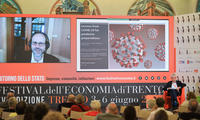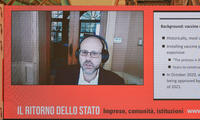
“The vaccine has been produced at an incredible pace, but not fast enough, because in some countries we are running late”, said Kremer. “We must prepare for future pandemics in order to guarantee suitable production capacity, and to have research and development and the whole production chain in place”.
Kremer explained that most of the candidate vaccines were unsuccessful and that “many experts were saying that by the end of 2021 no vaccines would have been approved, or that at best 100 million doses would have been produced, whereas in actual fact we have gone well beyond those predictions”.
Recalling that the pandemic has led to monthly losses of up to 500 billion dollars in global GDP, Kremer underlined the decisive role of action by “governments that have spent money to increase production capacity, such as the United Kingdom and the USA, leading to an increase in global production capacity”.
“The speed of vaccination is a very important factor”, added Kremer “ and it is necessary to increase production capacity, because an increase in the range could be advantageous for all countries, given that this avoids stock shortages and prices do not increase”. For the Nobel laureate, it is fundamental to prepare now, because “we don’t know when a new pandemic may turn up” and “we must provide for capacity that can be extended in case of need, so that it is possible to rapidly vaccinate the world”. Having a large number of doses also makes it possible to “overcome the problem of vaccine nationalism. A global effort is required to increase production capacity”.
Kremer then emphasised it is necessary to incentivise research and innovation in the vaccine sector, avoiding a producer monopoly because this reduces access to medicines. The model to be supported
involves “advance market commitments, as took place in the case of the pneumococcus vaccine. In this case there was public investment of 1.5 billion dollars and 3 different vaccines were prepared, saving 700,000 lives. This approach, establishing advance market commitments to have a sufficient number of vaccines to cover the total global population, was successful and can guide research and development to guarantee access to vaccines”.
Rappuoli instead underlined that he was “pleased to have been wrong” about the time necessary for vaccines, “given that the first vaccines were developed in ten months, and not in the three years initially expected. What is the reason for this? The Covid-19 vaccine turned out to be very easy to produce, while another fundamental condition was the massive investment fielded by the private sector”.









